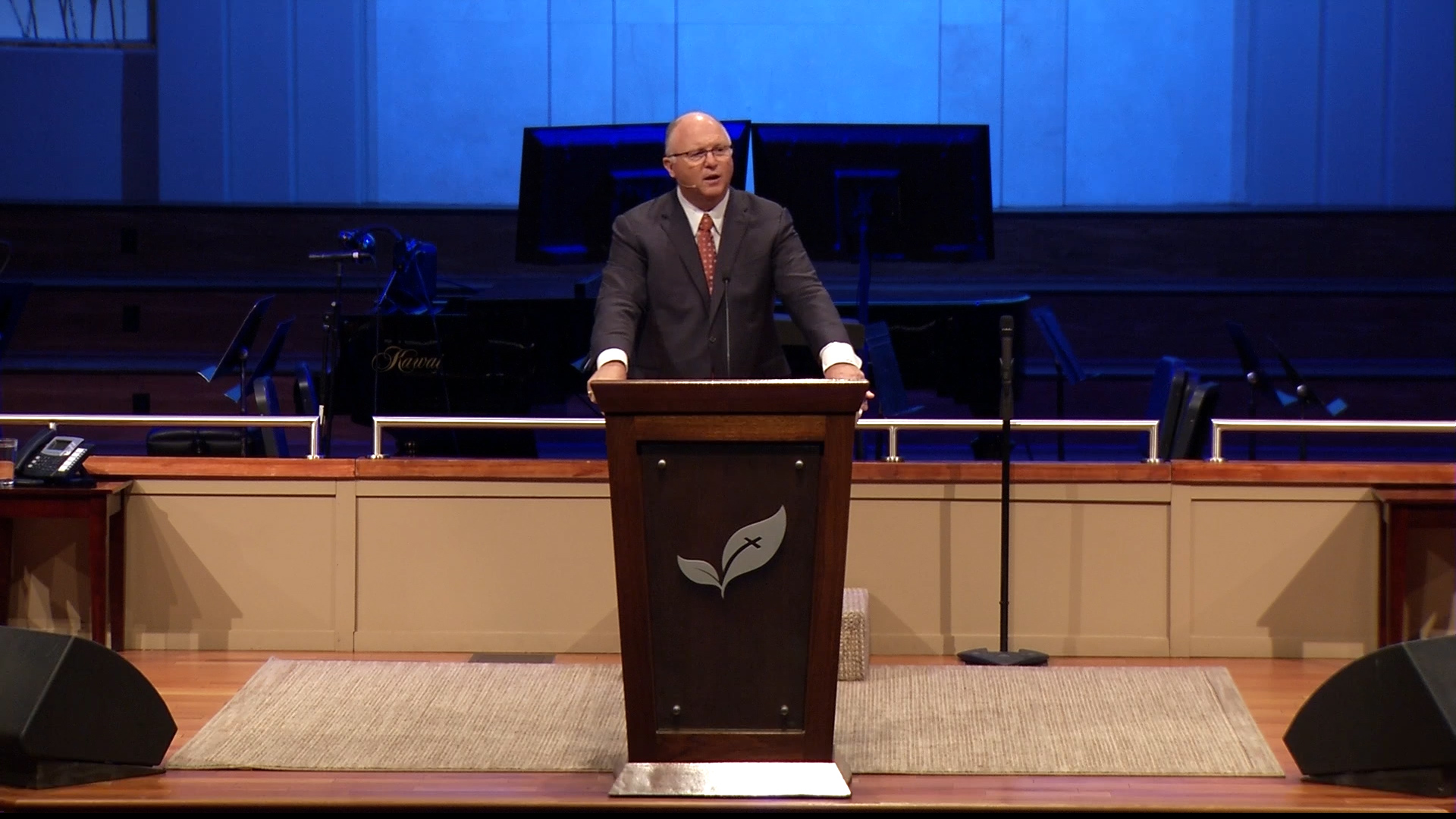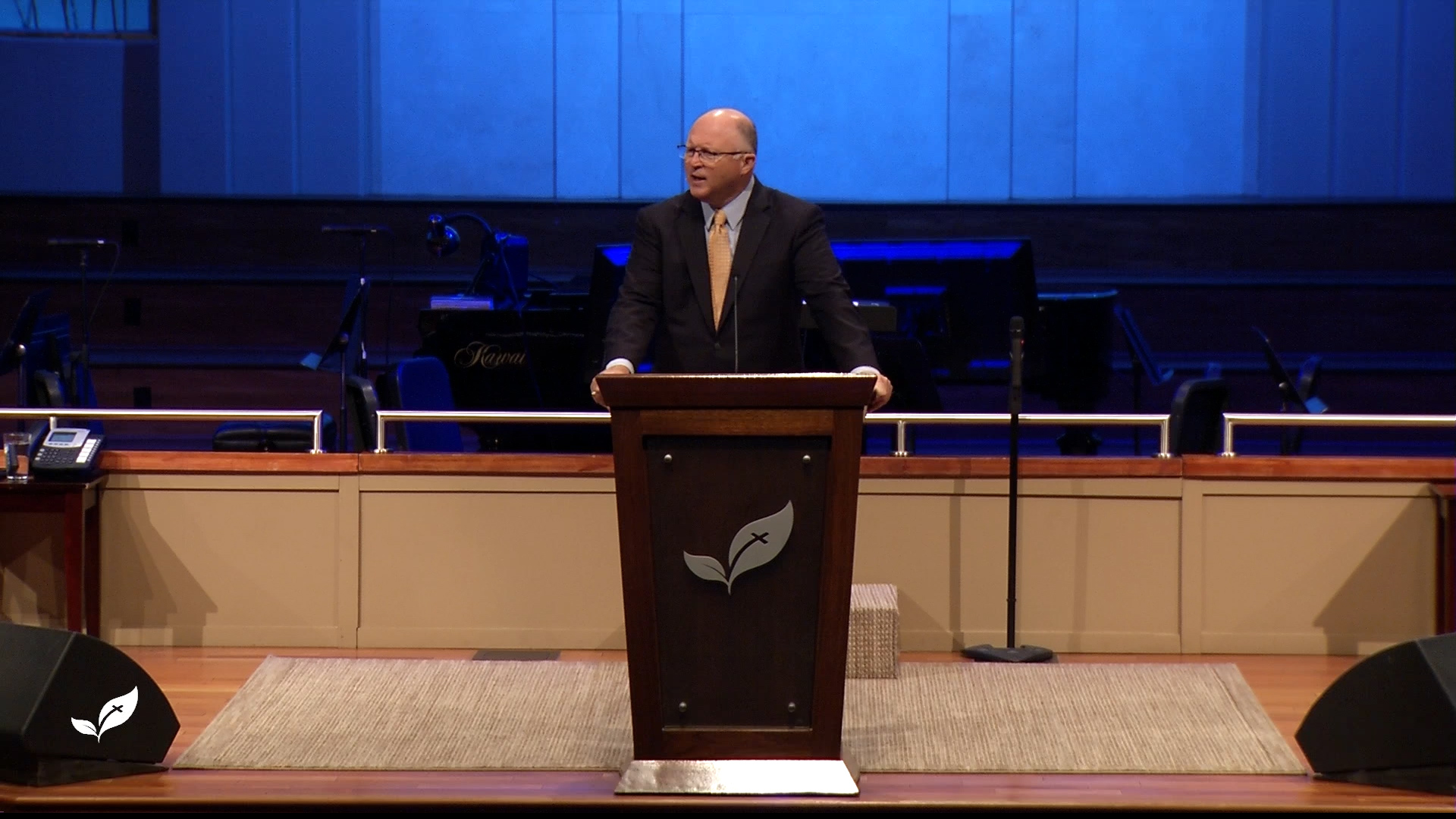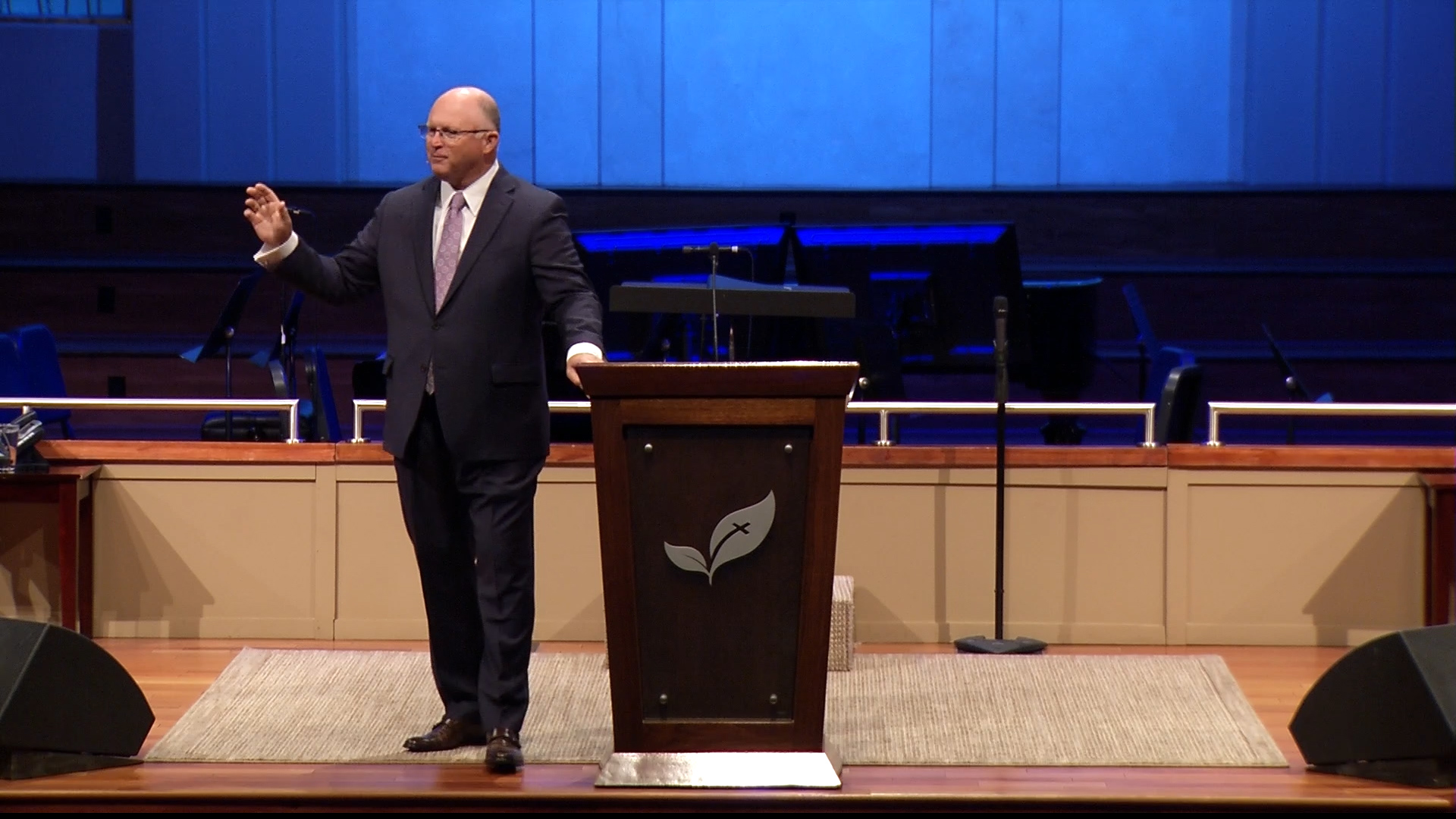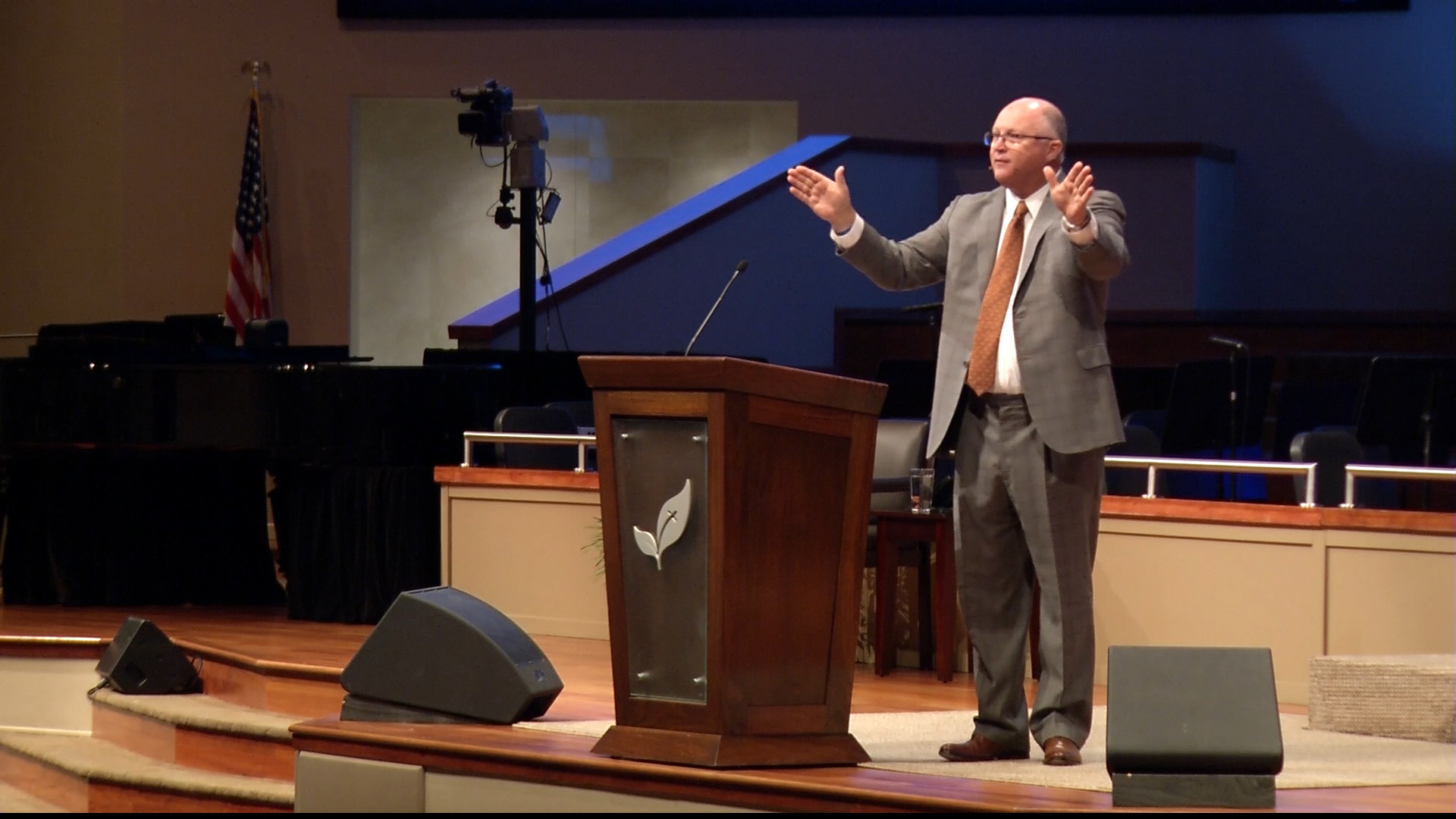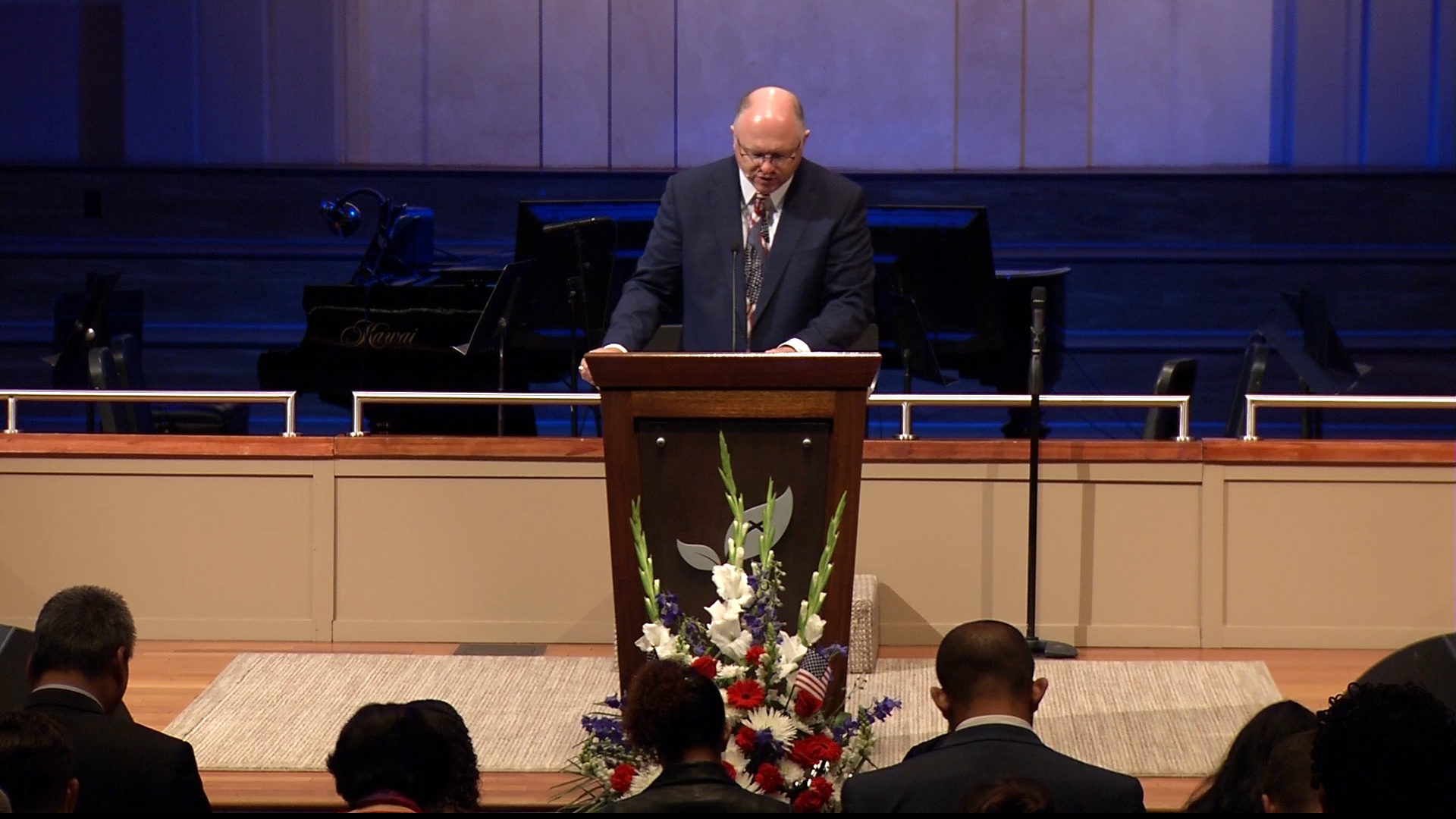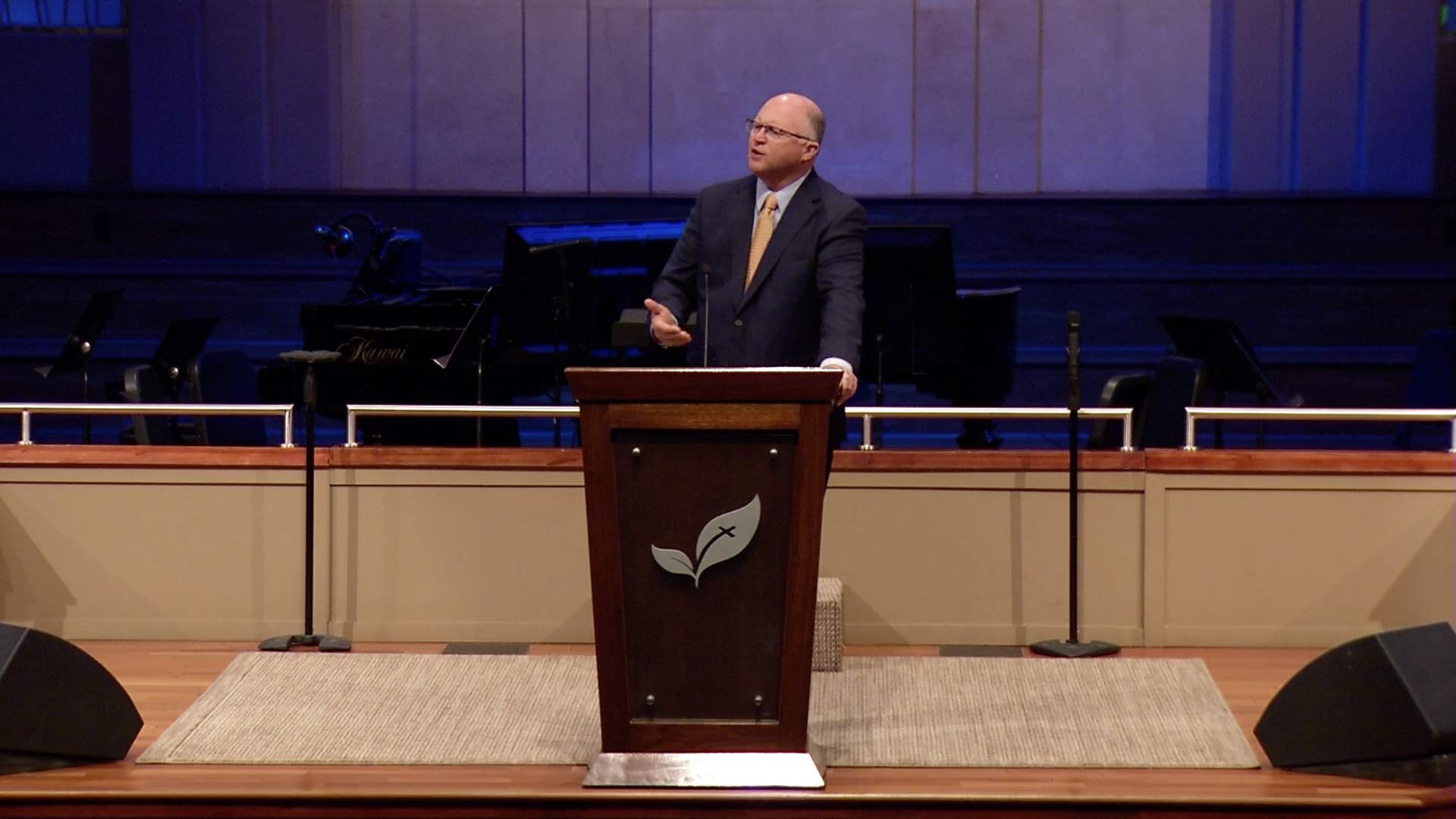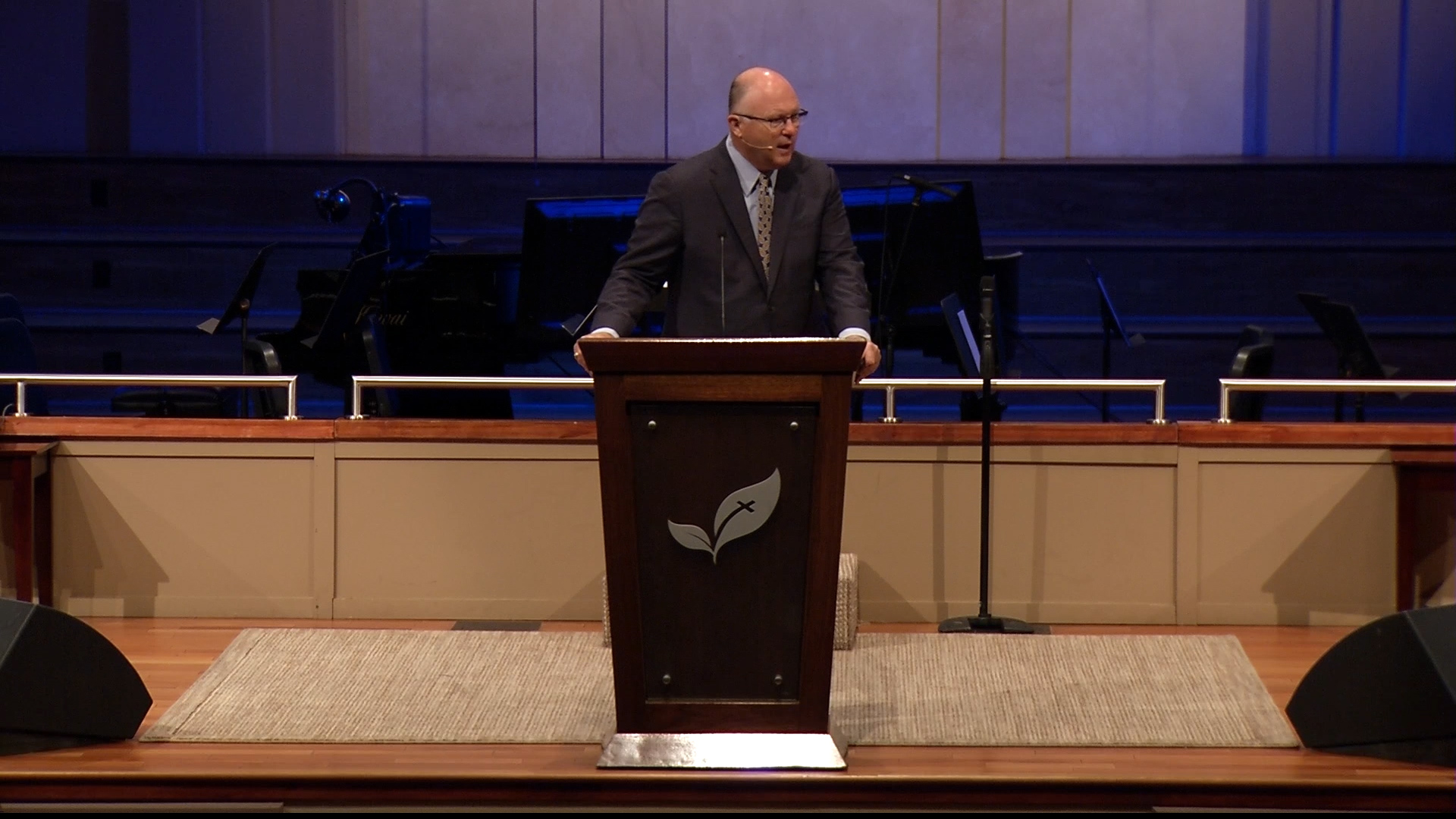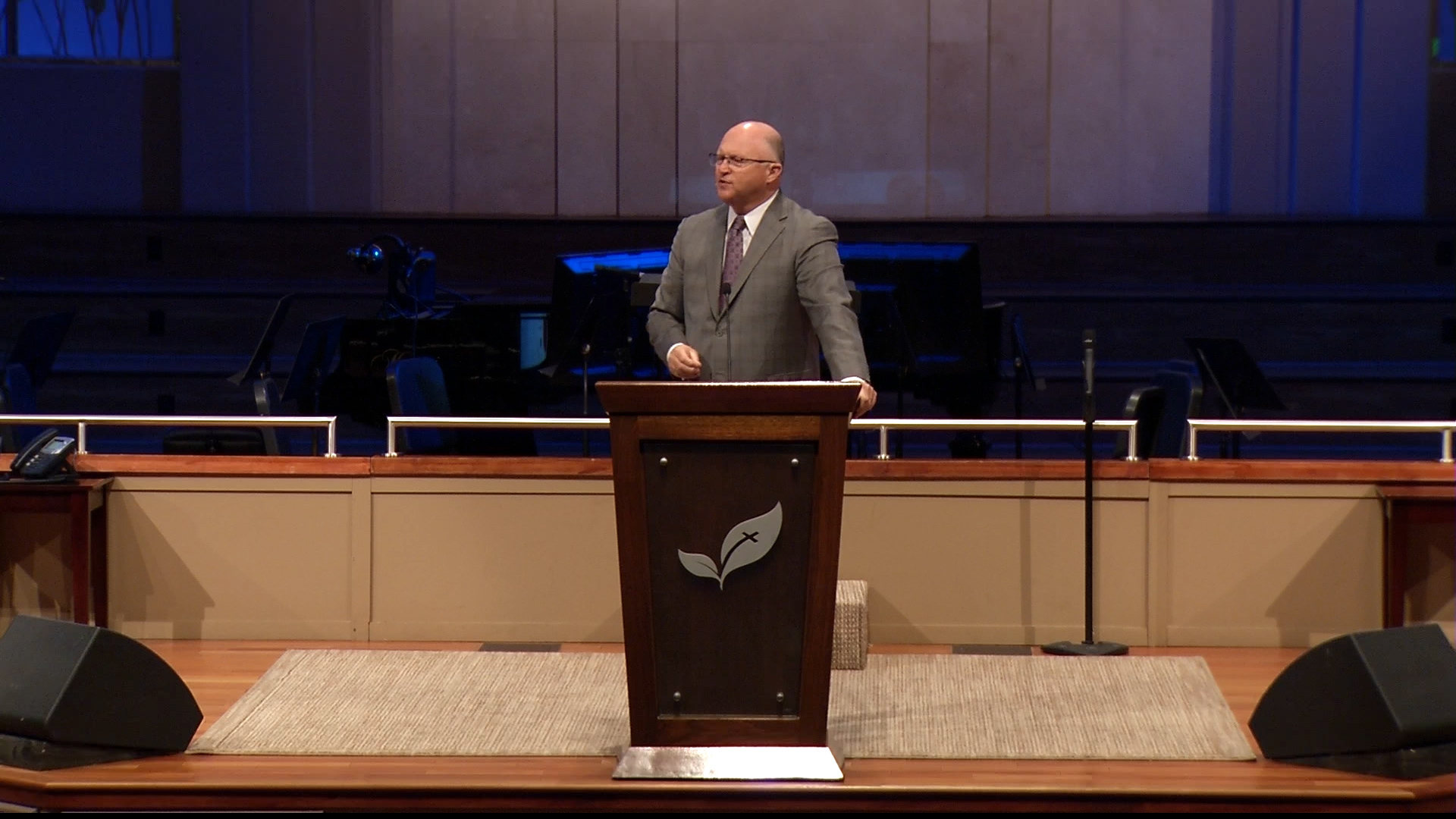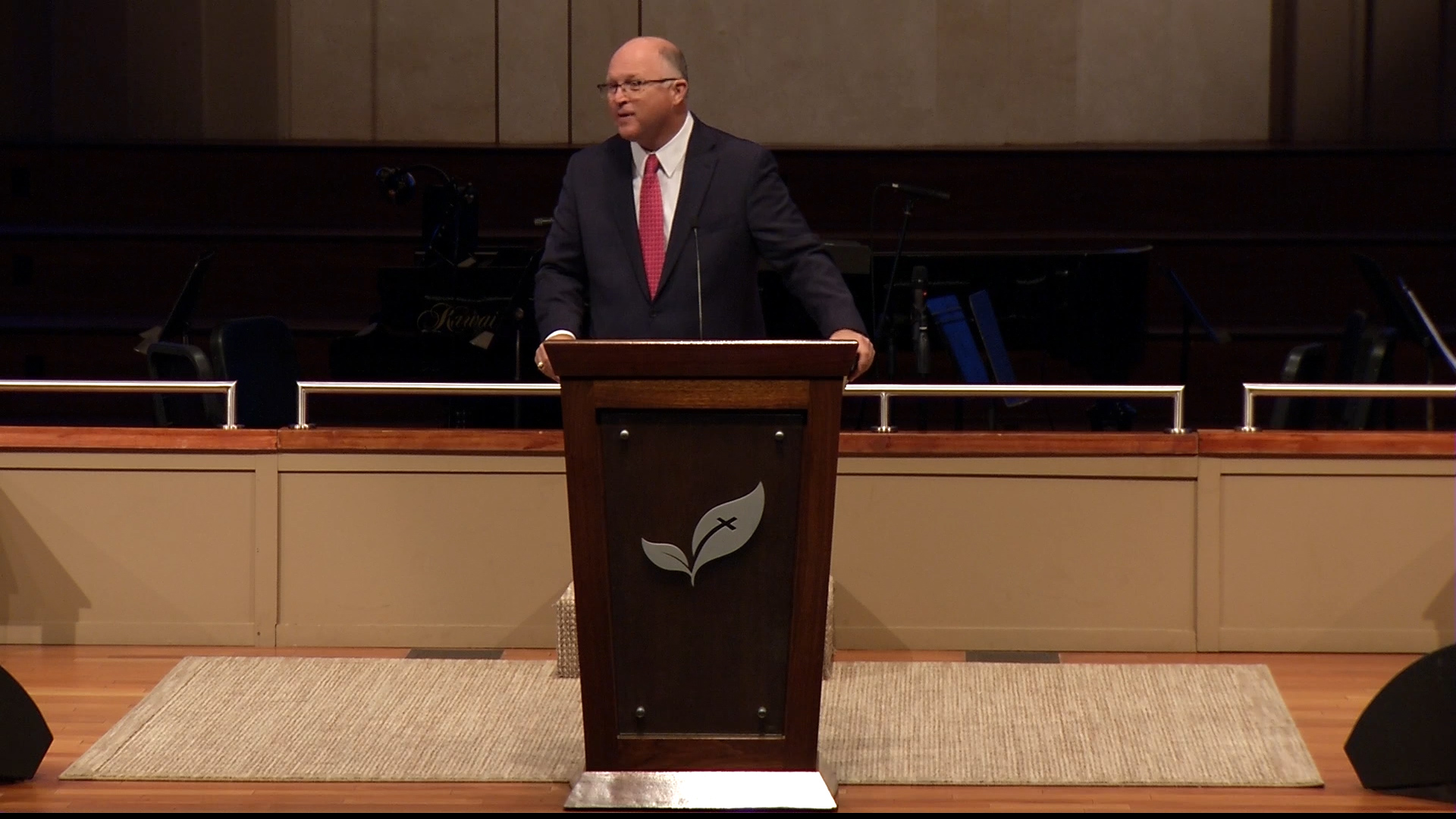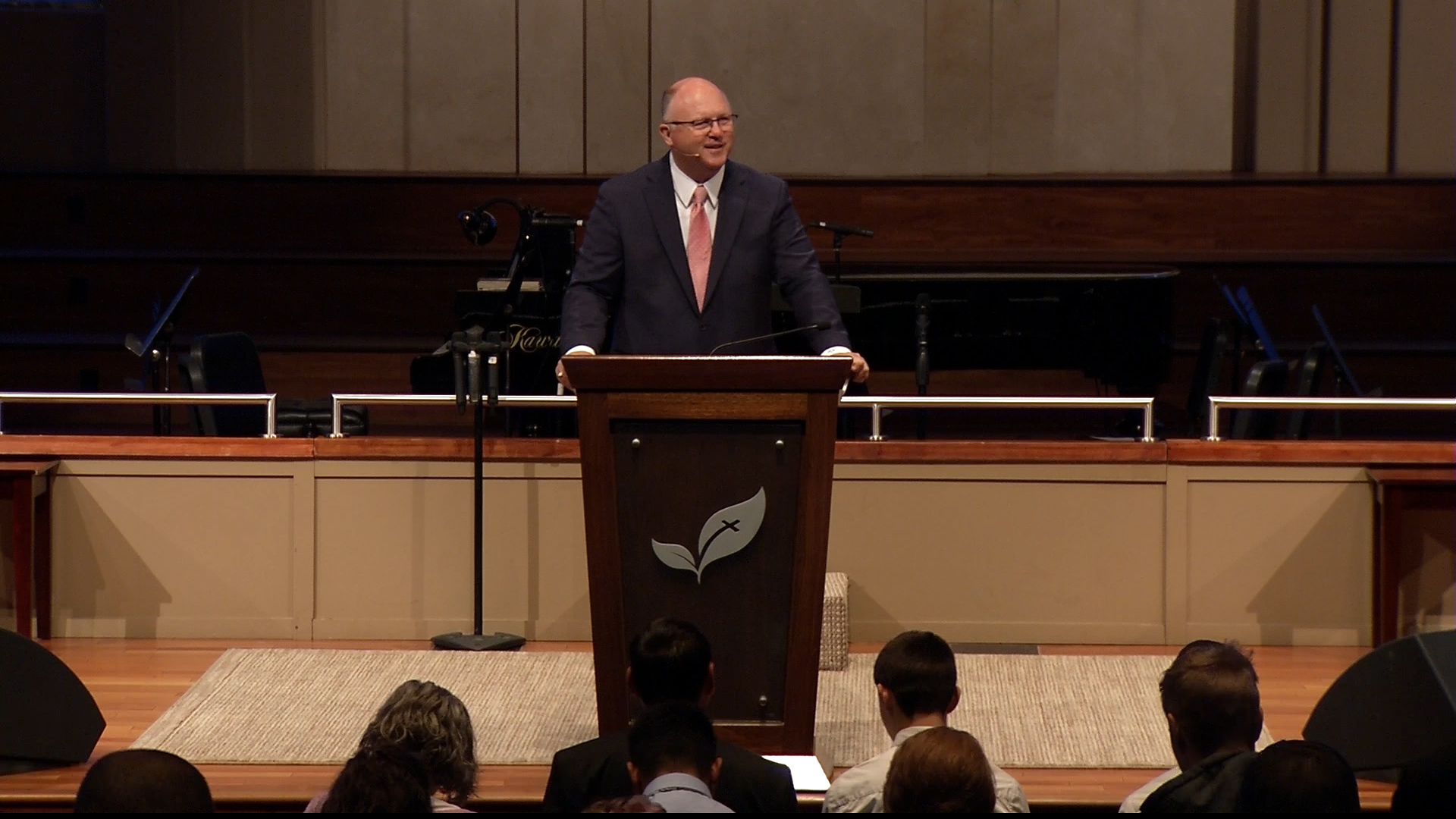This morning, turn to Romans chapter 7; and our series is entitles "New Life Today." And we have preached through Romans chapter 6, and today we're going to preach an overview of Romans chapter 7, a very unique chapter of the Bible. Some of my fellow preachers would consider me brave to preach this on a Sunday morning. It's a challenging passage, but I've enjoyed studying it, and I want to ask you to put your thinking cap on, follow in the notes; and I believe that by the time we come through this chapter and prepare to begin chapter 8 next week, we're going to be on a mountaintop of understanding of what Jesus Christ has done for us.
So let's stand together, if you can stand, please. Romans chapter 7. And today we are going to read, beginning in verse 14 and down through verse 25 in this our fourth message of the series "New Life Today." If you've missed any of Romans 6, let me encourage you to go online, lancasterbaptist.org. It's all there, it's all free. Download it, listen to it in the car, whatever, and stay right with us in this series. Romans 7. And you're going to find some unusual language. But stick with me and we'll expound upon it in just a moment.
Beginning in verse 14: "For we know that the law is spiritual: but I am carnal, sold under sin," sold under sin. "For that which I do I allow not: for what I would, that do I not; but what I hate, that do I. If then I do that which I would not, I consent unto the law that it is good. Now then it is no more I that do it, but sin that dwelleth in me. For I know that in me (that is, in my flesh,) dwelleth no good thing: for to will is present with me; but how to perform that which is good I find not. For the good that I would I do not: but the evil which I would not, that I do. Now if I do that I would not, it is no more I that do it, but sin that dwelleth in me.
"I find then a law, that, when I would do good, evil is present with me. For I delight in the law of God after the inward man: but I see another law in my members, warring against the law of my mind, and bringing me into captivity to the law of sin which is in my members. O wretched man that I am! who shall deliver me from the body of this death? I thank God through Jesus Christ our Lord. So then with the mind I myself serve the law of God; but with the flesh the law of sin."
Now how many of you would agree with me this morning that is an unusual passage in the New Testament? How many of you sense that just reading it? And how many of you can identify with that passage? Anybody? All right, we're already kind of sinking a little bit. And so, let's pray, and then we're going to jump right into this time of preaching together.
Father, thank you for the infallible word of God and for the treasures that it holds for us. Help us, Lord, to find new life today and every day in you; and teach us from this passage this morning, I pray in Jesus' name. Amen. You may be seated.
Well, today we learn that our victory is found in Jesus Christ. We also learn of the struggle that the apostle Paul experienced in his daily quest for victory. Now one reason that I trust the Scriptures and one reason that I believe in the truth of Scriptures is that God throughout Scripture tells us about the real struggle of the human authors of Scripture. We read about the emotions of Jeremiah. We read about the hurt and the pride of Elijah. We read about the depression of David. How many of you ever have read the Psalms and you think, "Boy, he was really going through it when he wrote these psalms"? And today, of all things, we read about the struggles of the apostle Paul himself, someone that I believe, other than Jesus Christ, may have been the greatest Christian that ever lived. And yet, the Holy Spirit gives us the truth of the matter in every situation.
Now we learned in Romans chapter 6 that we as Christians are buried in the likeness of his death, and raised in the likeness of his resurrection. We learn that we have victory at the cross. Paul said in Galatians chapter 2 that he was crucified with Christ: nevertheless he lives. We learned that our old man is defeated and that he has no dominion over us as Christians, and that we live today, and we are to live in the power of the presence of Jesus Christ.
And so, Romans 6 taught us to reckon ourselves dead to sin and alive unto Jesus Christ. We are to yield ourselves daily to the Lord Jesus Christ. But in chapter 7 we find that even the apostle Paul struggled. We find that there were times when he reckoned in his mind, but his body had another idea, or his members had another idea. And I believe many Christians would say the same, that we know what God would have us to do, but there's sometimes a fleshly pull to do otherwise.
Now the theme of Romans 7 really is the law of God. In fact, 23 times we read about the law of God in this chapter. And we find in this chapter the apostle Paul, who has already taught us that we can be emancipated from the power of sin, is teaching that we can be emancipated from the condemnation of the law. Now we're not going to get to that till the very end of the chapter, so stay with me along the way.
But by way of introduction I want to speak to you for a moment about the law. Sometimes we hear people talk about the law, and, "I don't want to be a part of the law." And certainly we're freed from the condemnation of the law. But what does the Bible really say about the law? Let me share a few things that are in your notes this morning.
First of all, we know from the Bible that the law is moral and the law is good. In fact, many of the laws of our land are derived from scriptural law. Psalm 19:7, "The law of the Lord is perfect, converting the soul: the testimony of the Lord is sure, making wise the simple." More desired are they to be than gold, yea, than much fine gold: sweeter also than honey in the honeycomb." The Bible says in Ecclesiastes 12:13, "Let us hear the conclusion of the whole matter: Fear God, and keep his commandments: for this is the whole duty of man."
So I want you to understand this morning that the law is moral and the law is good. And sometimes we hear people say, "Well, I don't have to follow the law anymore, I'm under grace," and that is a misinterpretation of Scripture; for the law is still our guide, it still directs us. The Holy Spirit, of course, leading us to obey and to conform to the image of Christ. But the law is good and the law is moral.
The second thing we learn in Scripture is that the law reveals sin. Now notice this in verse 7. It says, "What shall we say then? Is the law sin? God forbid. Nay, I had not known sin, but by the law." So the law of God is like sunlight. When light shines in a filthy place it does not make the place dirty, but it exposes the filth that is there that could not have been seen in the dark. So the law is morally good, and the law helps us to see where we fall short. In fact, without the law we would not be saved because it is the law that reminds us that we are sinners and that we need a Savior. And so, we see this morning the law reveals sin.
Thirdly, the law cannot save. Now the law can show us that we need to be saved, but it is important to remember that the law cannot save. Now sometimes you'll hear the term "legalist"; and when someone refers to a legalist, in the purest theological definition of a legalist, this is someone who taught that by keeping the law of God you could get saved. By obeying the laws, you could almost earn your way to heaven. That is the definition of a legalist.
Sometimes you'll hear the term "legalistic." That means maybe someone that's kind of making up a lot of extra things and being sort of holier than thou, and emphasizing the law more than grace perhaps. But the true definition of a legalist is someone who really taught that salvation is found by keeping the law of God. The fact, however, is that no one can keep the law of God.
Notice in your notes James 2:10, "For whosoever shall keep the whole law, and yet offend in one point, he is guilty of all." So the Bible says if you keep the whole law – and if you read the Old Testament, not just the Ten Commandments, but throughout the Scriptures – if you keep all of it but you mess up in one point, then you mess up in all. So the law cannot save. The law can only show us we need a Savior, all right. And so, just by way of introduction, the law is not the way to salvation.
Number four, the law dominates until we are in Christ. The law will continually point to our faults. It will continually show us that we are wrong. It will condemn us until we realize what Christ has done for us.
Now there's an amazing example of this in the early verses of chapter 7, and it's an example dealing with marriage and divorce; and it is not the comprehensive passage on divorce, and so we're not going there this morning. But there's an illustration used here, and I want you to see it in verse 1.
"Know ye not, brethren, (for I speak to them that know the law,) how that the law hath given dominion over a man as long as he liveth? For the woman which hath an husband is bound by the law to her husband so long as he liveth; but if the husband be dead, she is loosed from the law of her husband." Now don't get any ideas ladies, we're not going there with this passage this morning. But this is an illustration. What does the illustration tell us? It tells us that a woman is bound by the law to be faithful to her husband, but that she is loosed if her husband dies.
The application that we find here in Romans chapter 7 is very simply this, that when we died in Jesus Christ, we were emancipated from the law, and we were given grace by the Lord Jesus Christ. We are no longer condemned. In fact, let's just jump ahead to chapter 8 and verse 1. This is what I'm going to preach next Sunday morning.
But look at chapter 8 and verse 1: "There is therefore now no," – What's the word say? – "condemnation to them which are in Christ Jesus." So, as a woman is loosed from the law because of the death of her husband, we are loosed from the condemnation of the law because we are dead in Jesus Christ. The old man is crucified; we are buried with him in the likeness of his death.
Look, you don't go up to a traffic scene and see someone that had been drinking and driving, and they died in the accident, and you don't write that dead person a ticket. It's nonsensical. They're dead to the law. And so the condemnation of the law is no longer a force in the life of the believer, because there is no condemnation to those who are in Christ Jesus. The law, one author said, implies a broken relationship with God; whereas, grace implies a restored relationship with him. So when Paul said we died to the law, he meant we died to that entire state of condemnation, curse, and alienation from God.
And then, number five, the law is spiritual. Some people act like, "Well, we're in the New Testament age, so all the law of God is kind of obsolete." But I want you to know the law is spiritual. It is alive and it is still a guide for us. You say, "Why do you bring this point?" Look at verse 14 as we begin into our text.
It says, "For we know that the law is spiritual." So being saved does not mean that we disregard the moral laws of God. It's not like, "Okay, I'm saved, I'm never going to read the book of Numbers. I'm saved, I don't need to read the book of Genesis." No, no, no. The law, the Bible says in verse 14, is still spiritual.
So as we look into the passages of Romans 6, 7 and 8, we see that the law is perfect, we see that the new man that has been given to us in Jesus Christ dwells in us. But we're going to learn in chapter 7 that we also still live in a fleshly body, that we still live in the flesh, and so we are involved in a spiritual battle according to the word of God. And let's learn about this from the apostle Paul, and let's learn how to have victory in this spiritual battle.
If you're taking notes, notice, first of all this morning, the failure of the flesh. You see, the law reminds us where the flesh is failing. The Bible says in verse 14, "For we know that the law is spiritual: but I am carnal, sold under sin."
Now the question was asked in Romans 6:1, "Should a Christian sin willfully because he's under grace? God forbid." But do Christians battle with sin? Yes. The Bible makes it clear in chapter 7 that even the great apostle Paul knew in his mind spiritually certain things, but the members of his body warred in another direction. In fact, he says in verse 14, "I am carnal." Let's say that together: "I am carnal." I knew you were, I just wanted to hear you say it. All right – no, just kidding.
So Paul says, "I am carnal." And the word for "carnal" is the Greek word sarkos which speaks of the flesh. He said, "I am made of the flesh." And when you study theologically the kinds of people in the world today – I'm not talking about Asian, African, Hispanic; I'm talking about saved, lost, and carnal. A carnal Christian is someone who has received Christ, but they're not walking in the Spirit, they're walking in the flesh. And the Bible says that this is a walk of failure. It is a walk of frustration to walk in the flesh.
So notice, Letter A, the ongoing battle. The Bible says in verse 15, "For that which I do I allow not." In other words, "That which I know I should do I don't do: for what I would, that I do not; but what I hate, that I do."
Now here you begin to see the apostle Paul speaking of the battle that he faced in his own life. And it is mentioned also in Galatians 5:17. Notice what it says: "For the flesh lusteth against the Spirit, and the Spirit against the flesh: and these are contrary the one to the other: so that ye cannot do the things that ye would." Now the Holy Spirit – this is the new man in us, and the Holy Spirit lusteth, or battles, against the flesh. We live in a fleshly body, and there is a battle. There is death to the old man, the dominion of the old man; but we still have a fleshly body in which we live.
So when we look at verses 14 and 15 we see the law is spiritual, but the mind is carnal. Paul says, "I have a fleshly nature." Now, please, this is not talking about an unsaved man; Paul was certainly saved. But he was talking about the power of the flesh, the fleshly thinking and living. The flesh thinks it can conquer evil, but the flesh is evil itself. And the clash that he describes is real. This was real within him.
And I believe it's real within many of you as well. There's this desire in your mind of the new man to know what is right, but the body says, "Stay in bed. Drink that. Say this. Be mad about this. Have this thought or that thought," you see. It's a clash.
Look at verse 15. He says, "But what I hate, that I do." Look at the clash of the will that is seen there. It's the clashing. Notice verse 23, there's a clashing of the mind he says. "But I see another law in my members, warring against the law of my mind, and bringing me into captivity to the law of sin which is in my members." He says, "Sometimes there's a law between my mind and my members. In my mind I know the Lord's will, but my body, my flesh also has a desire." The lust of the flesh, the battles of the mind.
Now every one of us need to recognize that the indwelling sin within us needs to be dethroned. Every one of us must recognize that it can only be dethroned by the reckoning of the power of God and the cross of Jesus Christ within our life. So there's an ongoing battle.
But notice, secondly, there's an ever-present enemy, verse 17: "Now then it is no more I that do it, but sin that dwelleth in me. For I know that in me (that is, in my flesh,) dwelleth no good thing."
Now I know what the positive thinking books say. They say, "Look at yourself in the mirror every morning and tell the mirror, 'You're going to go get 'em, tiger. You're a great looking man. You are wonderful. You can conquer the enemy. You can do it. You can do it.'" The Bible says that we should look ourselves in the mirror and say, "Without Jesus you're going to flop," you see. There's an ever-present enemy and that is our flesh.
Now in this section, the apostle Paul is really – we could call it the lamentations of the apostle Paul. He is lamenting the battle with the flesh, and he says, "Nothing good dwells in the flesh. The old man of dominion has been crucified. Sin does not have to dominate me anymore. But the flesh is still there."
Here's a great quote and I want you to read it with me, follow along with me. It says, "After salvation, sin, like a deposed and exiled ruler, no longer reigns in a person's life; but it manages to survive. It no longer resides in the innermost self, but finds its residual dwelling in his flesh. In the unredeemed humanness that remains until a believer meets the Lord at the rapture or at death, in other words, the ultimate delivery from this flesh is when we see the Lord Jesus Christ." And we'll study that in just a moment. But the fact is that nothing good dwells in the flesh. And the fact is this morning that the flesh cannot produce righteousness.
Now please understand, you can wear a nice suit, you can carry King James Bible, you can know all the religious words, and you can do all of that in the flesh. The flesh is oftentimes deceitful. And we think, "Boy, look at him, he looks good." But God says, "I see the heart."
And the Bible says in verse 18, "For to will is present with me; but how to perform that which is good I find not. For the good that I would do I do not: but the evil which I would not, that I do. Now if I do that I would not, it is no more I that do it, but sin that dwelleth in me." So here we see the carnal and the spiritual have conflicting purposes. Paul said, "I know what I should do, but there's a conflict with the carnal man within me." Paul's will is purposed to live by the law; but he realizes in his flesh dwelleth no good thing, and through the flesh he will never accomplish what God wants him to accomplish.
Now, folks, let's just think about the profundity of this for a moment. Here is the greatest Christian that ever lived, perhaps, telling us that the things that he knows he should do according to the law, sometimes he doesn't do. I don't know about you, I find this to be a very profound passage. And again, I want to ask you: How many of you would just honestly say, "I've been here before, what he's talking about"? Anybody else, or am I the only one? Okay.
So this is a very relevant passage of Scripture. In fact, Paul even says this. Look in your notes at Philippians 3:12. He says, "Not as though I had already attained." He said, "I'm not there yet. Either we're already perfect." Notice verse 13: "Brethren, I count not myself to have apprehended." You see, here's a man who's saying, "I'm not going to tell you that I've never had temptation. I'm not going to tell you I always obey the law. I'm not going to tell you that I am perfect." He said, "I'm not perfect, I'm carnal," he says.
And I'm going to tell you, after 38 years of preaching and 33 years of pastoring this church, the hardest people to help are the ones who will not admit they need help. "I'm fine, I'm fine. No, my granddad was a Baptist preacher." So what. "No, I've read the Bible 17 times." Congratulation. You want a ribbon? I mean, what does that mean? "No, no, no. I mean, other people need that. I'm good, I'm good. I know you haven't seen me for six months and I know you've had to bail me out of jail twice, but I'm good."
You see, until we honestly say, "I live in a fleshly body, and I need Jesus Christ every day, and I need to walk in the Spirit," until we say what Paul said, "I have not apprehended," we're not going to get what we need this morning, because we're not just here doing church like, "Hey, lookin' good." We're here today to say, "Lord, I haven't apprehended yet." And this is what Paul says in this passage. So he shows us the failure of the flesh.
But notice, secondly, the desire for deliverance. Now if you've had this kind of struggle with the flesh, it can get old; and some people quit. Let me say again: some people quit. Some people say, "Ah, it didn't work; see ya later." But look at what Paul does, the question he says in verse 24: "O wretched man that I am! Who shall deliver me from the body of this death?"
Now here's an honest question: "Boy, I know what I'm supposed to do, but I don't do it." And he says, "O wretched." Now we would say, "Paul, don't be so hard on yourself. I mean, come on, you were shipwrecked, you were beaten with rods, you were stoned and cast out of a city, and you did all of that for Jesus. You're not a wretched man, you're a good guy; because if you're a wretched man, what am I?"
But Paul says, "Wretched man that I am." Now why would he say that? Well, remember he's writing these words under the inspiration of the Holy Spirit of God. He's in the very presence of God. He knows about the holiness of God, and he just simply says, "You know, as I am here in the presence of God thinking about how I struggle, I see myself as a wretched man." And if we would see God high and lifted up we would realize that we do fall short. And this is what he means: "I'm a wretched man."
Hudson Taylor, one of the greatest missionaries to every serve in China, came to Melbourne, Australia to preach at a meeting. And as he was introduced, Hudson Taylor was introduced as the illustrious guest who had started many churches and done all these great things, and all of these flowery words were said. And when Hudson Taylor stood to preach before the crowd in Melbourne he said, "Dear friends, I am the little servant of an illustrious Master."
You see, the closer you get to God, the more you realize, "I haven't apprehended. I still struggle." And I say that today not to glorify the struggle, but to say don't let the Devil kick you because you've had a carnal thought or because you're not as seemingly perfect as someone else, when the apostle Paul himself shares this truth with us. The Bible says in Psalm 130:3, "If thou, Lord, shouldest mark iniquities, O Lord, who shall stand? But there is forgiveness with thee, that thou mayest be feared," you see.
This lamentation of the apostle Paul was a painful conflict. And so he shows us a solemn assessment of himself. And then notice this lamentable question he says: "Who shall deliver me from this body of death? Now who will rescue me?"
Now there was a tradition in the hometown of the apostle Paul. We refer to him at times as Saul of Tarsus. And in the city of Tarsus if someone committed murder they had a strange way of beginning their punishment, and they would take the body of the murdered and they would tie the body of the murdered onto the body of the murderer, and the one that had committed the crime would carry the dead corpse around town on his body, would carry the stink and the stench and the weight of that body.
And Paul is using an analogy when he says here, "Who shall deliver me from this body of death?" He says, "This struggle, it stinks. This struggle is heavy, this fighting with the flesh. Who; how can I be delivered?" The question then is, "Who will deliver Paul?" because Paul acknowledges he can't do it.
How many of you have figured out you can't live the Christian life? We can't do it on our own, we need deliverance, we need help, we need guidance. And that brings us to the main point this morning. Notice, finally, the victory that we have in Jesus Christ. We've seen the failure of the carnal life. We've seen the desire to be delivered. "Who can deliver me?"
But notice verse 25, and let's read that first sentence. Ready, begin: "I thank God through Jesus Christ our Lord." One more time, now that you've found it. Ready, begin: "I thank God through Jesus Christ our Lord."
The victory over sin is found in Jesus Christ alone. You say, "Pastor, why do you say that?" First of all, because we have tasted of his grace. If you have tasted of the grace of God, that grace that saved you is the grace that can guide you. It's the grace that can keep you from sin.
Notice in Romans 8:23 it says, "And not only they, but ourselves also, which have the firstfruits of the Spirit." Now look right up here. I know some of you are new in the Lord. What does this mean? The firstfruits of the Spirit speaks about when you got saved, the Spirit of God. That which is born of the flesh is flesh, that which is born of the Spirit is Spirit. When you were saved, you partook of the firstfruits of the Spirit. God began his work in you. You were sanctified, set apart by his Spirit. You are being sanctified, cleansed and guided by his Spirit. And one day when you see Jesus you will be ultimately sanctified. So we have tasted of the firstfruits of the Spirit.
Notice verse 23 there of Romans 8, "Even we ourselves groan within ourselves," now please watch this, "waiting for the adoption, to wit," notice, "the redemption of our body." Say that phrase, please: "The redemption of our body."
So I have tasted of the Holy Spirit, I'm saved. The Lord is in me, the new man is in me. But I'm waiting for the redemption of my body, because this sinful body has not been redeemed. This sinful body still has a pull and a tug and a brain that doesn't think right always, and there are temptations. And so I've tasted of the grace of God. But I can't wait to get my new body someday. Are you with me this morning? Okay. So, we've tasted.
By the way, how many of you have tasted of the grace of God? Let me see. Remember when you got saved? Remember what that tasted like? It tasted good. "Whew, my sins are forgiven. I want to know more about this Bible. Oh, what does the choir see in that? Oh, that's what that means. Oh, that's that verse; I see it." You've tasted of it, and you wanted it, and you're thirsty for it, and you've tasted of the grace of God; and what a blessing that is.
You see, God has given you the blessing of his grace. But now notice, secondly, we will be redeemed by his grace through our Lord Jesus Christ. So he says, "Who will deliver me from this body of death?" There's no doubt Paul had tasted of the grace; but you sense he's weary with this carnality. "I am carnal," he says. "Who will deliver me from this?" And he tells us, "I thank God through Jesus Christ our Lord."
Now we must then identify with Jesus Christ our Lord. And let me say, there are two ways to have new life every day. First is through our identity in Christ; and second is by the hope that one day we will see him face to face, and we will receive a brand new body in that day. But for now, we must find our identity in the finished work of Jesus Christ.
So go back for a quick moment and look at Romans 6:4 in your Bible or in your notes. Notice what it says: "Therefore we are buried with him by baptism into death: that like as Christ was raised from the dead by the glory of the Father, even so we also should walk in newness of life." So when we were saved, we were buried with him, we were baptized with him into his death. We identify with his death." Paul said, "I am crucified with Christ." He said, "When Jesus died, I died. Nevertheless I live."
How does a dead man live? By the power of the Holy Spirit of God. So here we identify with that every day: "Lord Jesus, I identify with the fact that the old man has no longer dominion over me, but that your Spirit lives in me," and guides me, and directs me."
Verse 5: "For if we have been planted together in the likeness of his death, we shall also be in the likeness of his resurrection: knowing this," watch this now, "that our old man is crucified with him, that the body of sin might be destroyed, that henceforth we should not serve sin. For he that is dead is freed from sin." This is why Paul said, "I die daily." This is why Paul said, "Reckon yourself to be dead unto sin and alive unto Jesus Christ."
And so, we see that there is a daily identifying with the cross, a daily dying. And I have prayed for 30 years these things: "Lord, help me to be dead to sin and self today, and help me to be alive to your Holy Spirit today." You say, "Pastor, have you always been dead to carnality?" No. But I pray daily that I might find my life in Christ, dead to self and alive in his Spirit. This is my prayer. This is my desire. And this is how you have new life every day, to see your identity in Jesus Christ. So that's daily identity, and that's daily victory.
But what about the ultimate victory, because you say, "Pastor, even when you pray for that victory, Paul himself said that he was carnal, and that he knew in his mind but he struggled. So how does this one day really become a life of victory?" Well, I want you to notice, if you would, in your notes 1 Corinthians 15:52. The Bible tells us that there is coming a time, "In a moment, in the twinkling of an eye, at the last trump": this is the time when Jesus raptures his church, "for the trumpet shall sound, and the dead shall be raised incorruptible, and we shall be changed. For this corruptible must put on incorruption, and this mortal must put on immortality."
So this sinful flesh in which I live, this carnal body one day is going to be set aside, and this corruptible, this that thinks sinfully in the brain or walks sinfully with feet, or this that feels sickly, this body, this corruptible body will be put away, and we will put on an incorruptible body. For the Bible says when we see him, we shall be like him. And so, friends, I want you to realize that we are living daily victoriously when we reckon ourselves dead to sin and alive to Christ. But ultimately the victory is coming, because this corruptible will put on incorruption. Now let me illustrate it for you just a little bit.
This past week I was having some pain one night. I felt like I was swallowing razor blades; I had such a sore throat. And finally I got up and said, "This is nuts," and I went into Urgent Care. I went into Urgent Care, and so they gave me some medicine, and they told me what to do with all of it, and they said, "Now, first of all, here, this is for your infection." And I'm still taking that one there. And they said, "Take one of those a day." They said, "Here's some Prednisone. This will open up your throat so you can talk and preach, and it'll help you." So I started taking that; still taking that one there.
They said, "Now here's some other stuff. This is expectorant to help you with your cough." And they said, "Now here's some more stuff right here. This is Naproxen; this is going to help you for your pain. Take this for your pain." And I'm still taking that. And they said, "Here, now take this one here. This is going to help you for the ulcers that all the other ones cause. So you've got to take this, take care of those ulcers." And so, then they gave me – I meant to bring it – about 40 pages of reading about all the bad stuff that medicine does to you if you take all the stuff. And I thought, "Good night, it's a good thing I'm a fast reader, I'd never get well for reading all the paper you have to read first."
So let me illustrate it this way. My body and yours becomes sick, and the white blood cells start to fight, and we take some medicine, and we begin to battle in the body for a point of wellness. And I'm starting to feel some better now, and you gain some health, and then you operate for a while. But the honest truth of the matter is that one day this corruptible body, the heart in my body, the lungs in my body, they're going to stop working. Unless the Lord calls me home in the rapture, the fact of the matter is that I live in a corruptible body. I'm not trying to be depressed. Guys over 50, so do you.
The only ultimate victory that we have is that Jesus Christ has promised us an incorruptible body. By the way, how many of you are thankful for that? Some of you guy are going, "Well, this is kind of like church talk; I don't get all this." Let me tell you what. You know when this really matters? When you're a pastor preaching someone's funeral. You'd better hope they've accepted Christ, because if they have, then you can tell the congregation they have a new body and a new home right now. And if they reject Jesus Christ, you can't say that.
So Paul said, "Where's the deliverance?" And he says, "Through our Lord Jesus Christ." And now, the medicine may deliver me from some pain for a while – watch this – and if I die to self and if I walk in the Spirit, I can have new spiritual life. But there's still struggles and there's still temptations.
Where is the ultimate victory? The ultimate victory is when the trump of God will sound. The ultimate victory, 1 Corinthians 15:56, "The sting of death is sin; and the strength of sin is the law. But thanks be unto God, which giveth us our victory through the Lord Jesus Christ." You see, we have the ultimate victory in the Lord Jesus Christ; and what a great promise that is.
So I can have new life today as I take the spiritual medicine, as I die to self, as I find my identity in Christ. But I know that I'm operating from the winning side, because ultimately this corruptible body is going to be put off, and a new and an incorruptible body will be put on. How many of you are thankful for that promise today? Amen. Some of us, we get up in the morning, it's like snap, crackle, pop. You've got to get your hip in place, and your knee in place, and your teeth in place, and your mind in place. But one day, all of that will be in place. Amen.
So here it is. The Christian then can say that a new man is already living in him. How many of you are thankful for the presence of the Lord in your life today? He's the one that guides you into the truths of Scripture. He guides you away from sin. If you're saved this morning, the Lord is guiding you, and the Lord is with you. The Christian can say that a new man is living in him. But he must also confess that the sinful part of his old man has not yet ceased to be. Therefore we must daily find our identity in Jesus Christ, and we must ultimately find our hope in the coming of Jesus Christ, because at that time this old body will be set aside with its sickness, with its sin, with its temptation, and we will be like Jesus; and what a day that will be. What a great day that will be. Until then, we must, as God's people, mortify the flesh, or die to self, and walk in the Spirit.
Look, as we close, at Colossians 3:3, "For ye are dead, and your life is hid with Christ in God. When Christ, who is our life, shall appear, then shall ye also appear with him in glory. Mortify therefore your members which are upon the earth; fornication, uncleanness, inordinate affection, evil concupiscence, and covetousness, which is idolatry."
If we would have new life today, then we can't live in the trashcan today. We can't live as carnal, fleshly people. And many Christians are living in the trashcan, when God wants us to live in the garden of his blessing. You don't have to live a carnal life. That's not to say that you won't have temptation or that you won't sin. Christians do sin. But we should not live a carnal life in the sense of a habitual life, when we are given the key to victory through the presence of the Lord Jesus Christ our Savior.
And so, I encourage you: find your identity in him. We are buried with him in the likeness of his death. We are raised with him in the likeness of his resurrection. And one day when we see him, this old body and all of its need for medicine, we're going to throw it all away, and we're going to receive a brand new body for all of eternity. And one of my favorite hymns is this: "It will worth it all when we see Christ."
So Christian friend, don't give up the fight. Don't begrudge the battle. Keep your eyes on Jesus. Mortify the deeds of the flesh. Walk in the Spirit. And one day when we see Christ, it will be worth it all.
[End of Audio]

